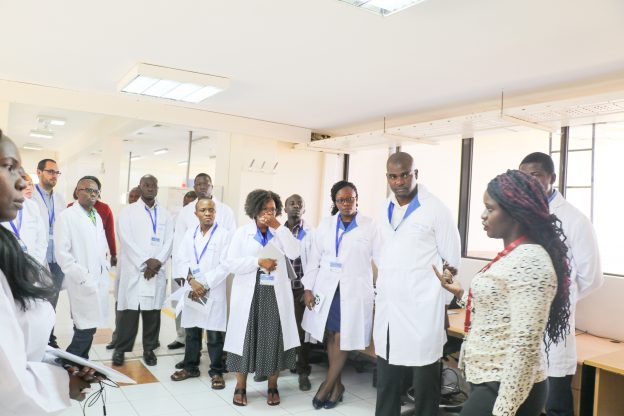CONNECTED conducts Virus and vector diagnostics workshop for selected researchers at BecA-ILRI Hub
The Community
Network for African Vector-Borne Plant Viruses (CONNECTED) formed a partnership
with BecA-ILRI Hub in 2018 that led to a five-day full-funded training course
for early career plant molecular biologists from across Africa. The course
titled: An introduction
to virus and vector diagnostics took place on 11-15 March and was hosted by
BecA-ILRI Hub in Nairobi, Kenya.

The course
trained 17 participants from 10 countries, carefully selected after a call for
early career researchers interested in virus and vector diagnostics was put out
by CONNECTED and shared on various digital platforms. The trainers were
Professor Neil Boonham from Newcastle University and Professor Gonçalo Silva
from The Natural Resources
Institute, University of Greenwich, UK. Their key objective was to empower the
participants with the ability to diagnose cassava and yam diseases by
empowering them with practical skills that can easily be used in their
fieldwork.
The
training began with opening remarks from Jacob Mignouna, BecA-ILRI Hub’s
Director: “This training highlights the
functions and goals of our diagnostic
platform, that is set up to provide knowledge and
technologies to help researchers advance their career goals.” This was followed by an
introduction of BecA’s technology platforms in a presentation made by BecA’s Technology
Manager, Josephine Birungi and a round table introduction of the participants
conducted by Julius Osaso, BecA’s diagnostic platform manager.

Professor
Boonham then took the trainees through an introduction to DNA Bar-coding and
instructed them on how to achieve high quality results to start off the
training, which was followed by a lab induction by ILRI’s health and safety
department (EOHS). After lunch, the trainees began their lab training that
involved DNA extraction and PCR amplification.
Over the
next couple of days, the trainees were taken through gel electrophoresis,
product purification, DNA prep for sequencing, LAMP and RPA amplification,
Database searching and DNA clustering. The training sessions included a morning
outline of activities and questions from the trainees, and a recap of the day’s
activities and general questions at the end of the training days.
“I am glad that this
workshop has brought in participants from our partner institutions such as
NACRRI with whom we already have on-going projects, but also the renewed
opportunities for other partnerships.” Julius Osaso, Diagnostics Manager,
BecA-ILRI Hub.
“I have learnt techniques such as bar-coding
that will help me distinguish the species of insects like the whitefly, which
is very important for the work that I do. I have to thank CONNECTED network and
BecA for this opportunity.” Helen Apio, NACRRI, Uganda
“I am a
trained entomologist with no prior experience on some of these techniques such
as PCR and DNA extraction, which are very important to me and my project work,
which is on aphids. I am grateful to CONNECTED because I can now integrate
entomology and microbiology to reach greater heights in my career.” Honest
Machekano, Botswana International University of Science and Technology (BIUST),
Botswana.
“The training has strengthened my skills,
which is great for my career, I now know how to diagnose viruses and identify
insect pests for plans, I will now be to identify what lies in resistant virus
lines.” Fred Masika,
ABCF alumni, Uganda.
The course funding included travel,
accommodation, course fees and subsistence. The participants came from 10
countries: Benin, Burundi,
Democratic Republic of Congo, Ghana, Kenya, Nigeria, South Africa, Tanzania,
Uganda and Zambia.

The
CONNECTED network is a project that is working to build a sustainable network
of international scientists and researchers to tackle vector-borne plant
diseases that devastate lives in Sub-Saharan Africa.
Early career
researchers who
might be interested in similar opportunities are invited to join the CONNECTED
network, which is free of charge by following this link.
